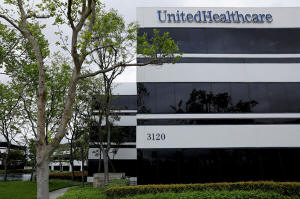Healthcare providers hit by frozen payments in ransomware outage
 Send a link to a friend
Send a link to a friend
 [February 29, 2024]
By Raphael Satter, Christopher Bing and Patrick Wingrove [February 29, 2024]
By Raphael Satter, Christopher Bing and Patrick Wingrove
WASHINGTON (Reuters) - Healthcare providers across the United States are
struggling to get paid following the week-long ransomware outage at a
key tech unit of UnitedHealth Group, with some smaller providers saying
they are already running low on cash.
Large hospital chains are also locked out of processing payments with
some absorbing the upfront costs of being unable to collect, according
to the American Hospital Association (AHA), which represents nearly
5,000 hospitals, healthcare systems, networks and other providers.
Reuters could not gauge the full magnitude of the problem, but six small
businesses across the United States - five therapists and one laboratory
- said they were unable to process claims and were racking up thousands
of dollars in overdue payments.
The problems began last week after hackers gained access to
UnitedHealth's Change Healthcare unit, a vital lynchpin in the complex
U.S. system for making and clearing insurance claims. It also affected
electronic pharmacy refills and insurance transactions, particularly
among independents, with some reverting to paper transactions.
"We are 100 percent down when it comes to billing right now," said Phil
Seubring, legal director at Forensic Fluids, a Kalamazoo, Michigan lab
that does drug testing for doctors' offices.

"I'm not getting paid," said Jenna Wolfson, a Felton, California-based
clinical social worker who provides therapy to about 30 clients a week.
She said she had about $4,000 in claims in limbo. "This could be
catastrophic for me and other small business mental health
practitioners."
The early impact may hit small offices harder, but providers of all
sizes will feel the strain if the outage persists, John Riggi, AHA
cybersecurity adviser and a former section chief for the FBI's cyber
division, told Reuters.
"Larger, more well-resourced hospitals that have alternate technologies
and sufficient cash reserves will be able to sustain the outage
initially and on a longer basis," he said.
Organizations that suffer high-impact ransomware attacks can take as
long as 30 days to restore core services and weeks longer to bring back
less important functions, Riggi said.
It was unclear whether other clearing houses could take on additional
claims traffic, and hospitals were anxiously waiting for Change to
introduce new workarounds, Riggi added.
[to top of second column]
|

The corporate logo of the UnitedHealth Group appears on the side of
one of their office buildings in Santa Ana, California, U.S., April
13, 2020. REUTERS/Mike Blake/File Photo

Other ransomware attacks last year, including on Clorox and MGM
Resorts International shut down key systems, hitting customers and
wreaking havoc with suppliers. They took weeks to resolve and hurt
both companies financially.
"It really depends on the damage that's been done... and the
resources they have available to put towards recovery," said Cliff
Steinhauer, director of information security and engagement at The
National Cybersecurity Alliance.
UnitedHealth said it understood the impact the hack has had on
payments but did not immediately respond to requests for comment on
how it is affecting hospitals with the issue now a week old.
"While ordinary people can still receive medical care and
appointments go on as planned, thousands, if not hundreds of
thousands, of providers will see their cash flow grind to a halt,"
said Dana Hughes, whose family runs a physical therapy practice in
Corvallis, Oregon.
She said she was unable to file claims after her software vendor
disconnected from Change Healthcare.
"Workarounds are not readily available, and will involve lengthier
processing time," she said. Going with an alternate clearinghouse
would cost her $300-$500, plus time.
A United Health spokesperson on Tuesday said claims submissions had
returned to pre-disruption levels, noting that many providers can
also use alternative clearing houses to submit claims.
UnitedHealth initially blamed a "suspected nation-state associated
cybersecurity threat actor" for the disruption, but sources told
Reuters a criminal gang dubbed "Blackcat" or "ALPHV" was
responsible.
(Reporting by Raphael Satter and Christopher Bing in Washington, and
Patrick Wingrove in New York; additional reporting by Sriparna Roy
in Bengaluru; Editing by Caroline Humer and Bill Berkrot)
[© 2024 Thomson Reuters. All rights reserved.]This material
may not be published, broadcast, rewritten or redistributed.
Thompson Reuters is solely responsible for this content. |